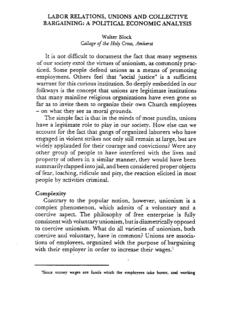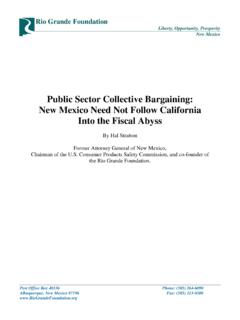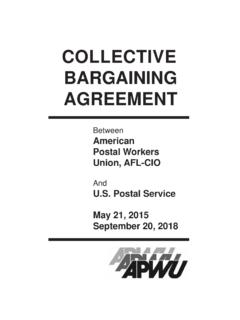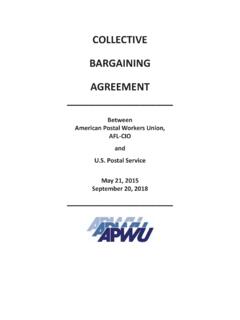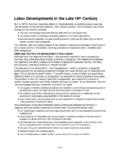Transcription of Collective Bargaining Manual - afge2361.org
1 Collective BARGAININGGUIDEP repared by the AFGE Field Services DepartmentINTRODUCTIONThe enactment of the Federal labor -Management Relations Statute as part (title 7) ofthe Civil Service Reform Act of 1978, and subsequent decisions of the Federal labor RelationsAuthority, established that upon demand by the exclusive representative, or prior to changinga "condition of employment," the employer is obligated to give prior notice to the union and,upon demand, bargain with the union prior to October, 1993, President Bill Clinton signed executive order 12871 which establishedthe National Partnership Council and mandated that all Executive agencies establish similarcouncils and partnership programs with unions representing agency employees.
2 It also gavea presidential direct order to executive agency managers to elect to bargain on matters referredto in 5 USC 7106(b)(1), commonly known as "management rights" which are "permissivesubjects" for this Manual addresses the traditional, so-called "adversarial," approach tobargaining, we will also mention non-adversarial approaches to various difficulties that mightarise in traditional Bargaining . This Manual is also written in the belief that the union officialwho is aware of all the rights and responsibilities of both parties in adversarial Bargaining canbetter appreciate the advantages of partnership relationships advocated by of the characteristics of partnership is that it requires a good deal of maturity andcommunication skills of the partners.
3 It is a matter of definition that a partnership requiresboth parties to continuously work at the maintenance of the relationship. For this reason, notall parties to an exclusive recognition are able to readily achieve the level of maturity , upon the failure of one or both parties to be able to attain the sophistication ofdealing required, it is necessary to understand the traditional labor -management processwhich already exists under of employment are defined in section 7103 of the Statute as,"Personnel policies, practices and matters, whether established by rule, regulation.
4 Or otherwiseaffecting working "The right to bargain collectively is guaranteed by Section 7114 of the Statute. An employeris obligated to honor these rights unless the union negotiates away their rights by agreeing to a "waiv-er," sometimes called a "zipper" clause. Unions rarely agree to a zipper clause unless they secure sub-stantial benefits in exchange to offset the loss of such an important right. In the absence of negotia-tions on economic issues, it is difficult to conceive of what management could offer the union thatwould induce it to agree to a zipper the parties cannot agree to proposed changes, the union should request mediation assistanceand if mediation fails, the impasse should be sent to the Federal Service Impasses Panel under currentAFGE procedures.
5 Impasses that arise during a term of a contract are processed in the same manneras Obligation to Negotiate:Section 7114 of the Statute comprehends an obligation to "negotiate" with respect to changesof the Statute and "Consultation" is required only with respect to those labor organizations accorded"national consultation rights" under the 7114 of the Statute requires that the parties meet at reasonable times and confer ingood faith with respect to personnel policies and practices and matters affecting working term "reasonable times" is not further defined in the Law.
6 It is evident that at the very least theduty thus described requires that the parties avoid unnecessary delays in the process of addition, a party must meet its obligation to negotiate prior to making changes in established per-sonnel policies and practices and matters affecting working conditions during the term of an Federal labor Relations Authority concluded that the law requires adequate notice andan opportunity to negotiate prior to changing established personnel policies and practices and mattersaffecting working conditions during the term of an existing agreement.
7 This requirement continuesin place throughout the term of the Collective Bargaining agreement unless the specific issues thusraised are controlled by current contractual commitments, or a full or partial waiver of bargainingrights is they are controlled by the contract already, then they may not be changed unless by mutualagreement. This means either party may simply say, "No," to a change which would conflict with thelabor a waiver has been agreed to, then the specific terms of that waiver must be are not all the same. They can be very broad or very narrow or anywhere in between.
8 Theclause containing a waiver may or may not describe itself as a waiver. The waiver usually describesitself, or it might be implied from the results of a combination of contract provisions. Waivers are dis-cussed in much more detail later on in this Manual . For now, you should understand that in itssimplest form, it means that a party or person gives up a right to which they would be entitled to butfor the some interpretations, a contract clause on a given procedure or requiring a certain act isconsidered a waiver of Bargaining for the term of that agreement because the net effect of the clauseis that no more Bargaining may take place on that specific item.
9 In other words, the matter coveredby that clause fixes the conditions its describes and there is not further obligation to bargain on it,absent another clause that might allow , it is called, an agreement on a specific matter is a contract term which both partiesare obligated to respect and to FOR NEGOTIATIONSI ntroductionThe role of the union drastically changes when it is granted exclusive recognition. It then hasthe right and the responsibility to speak for all workers in the Bargaining unit. More importantly, theunion has the right to negotiate a written contract with respect to conditions of employment asdefined in Section 7103 of the Statute as Personnel policies, practices and matters, whether established by rule, regulation orotherwise, affecting working SupportNegotiation of an effective contract requires strength.
10 The local should concentrate on streng-thening its organizational structure prior to entering committees should be established, an effective steward system formed, programsformulated, and most importantly, the views of the members must be secured on the issues which theywish to have included in their union's strength is frequently developed through local meetings to select members of thevarious committees, including those who will prepare for and conduct the contract negotiations. Man-agement will know if the negotiating committee has the support of the members and is speaking forthe majority af the Bargaining -unit employees.
